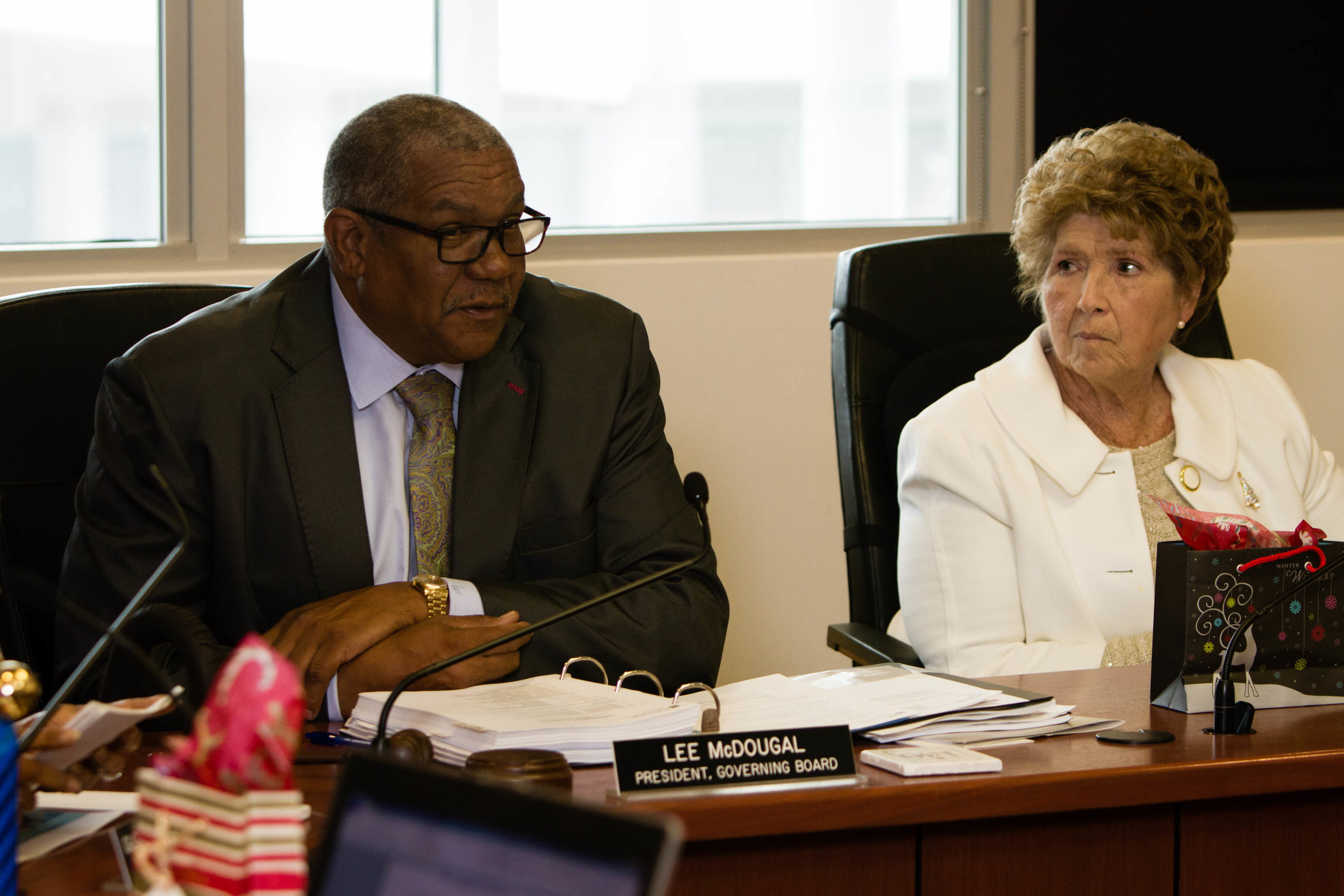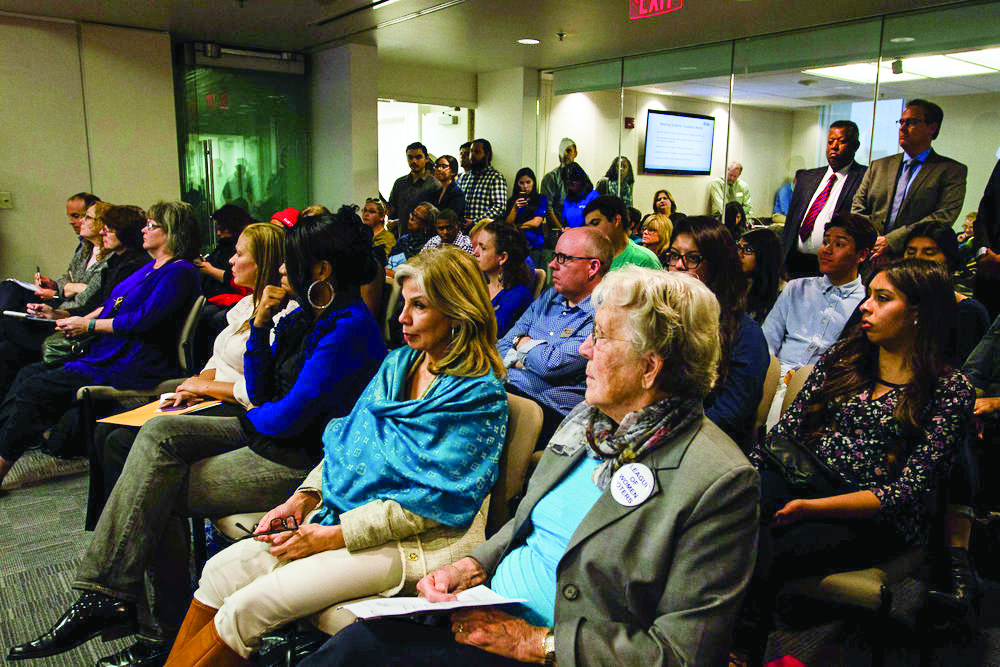Closing of the Learning Development Center
Above: The Learning Development Center now stands empty on the corner of Central Ave. and C St. in Chino. Photo by Daniel Steele.
By Daniel Steele. Additional reporting by Jullian Aiden Bravo
@MetalgearSteele @Mr_Reporter_
The typically spacious room used for the monthly governing board meetings was abnormally packed on Dec. 15 of last year. Concerned parents and students were anxiously waiting their turn to speak out against the school’s decision to close the LDC — a two-year program situated off the Chino campus that trained students with autism to find much-needed jobs.
“The Learning Development Center offered me a chance to get a job,” said Christian Townsend, a former student from the LDC. “Now that it’s closing, I don’t know what I’m going to do to get those skills.”
LaToya Townsend, Christian’s mother, also spoke to the governing board about her disappointment. She said her son and other disabled students did not feel welcome anymore like the rest of the school’s population.
“You have a tradition with helping students with disabilities,” she said. “(The) college is a community college and we are part of the community and are asking you to help those who are not fully able to help themselves.”
Other former LDC students and parents spoke to the board about there deep concern for the program’s closure. They each gave personal issues they have with finding job training. Because of their level of autism, the students at the meeting were unable to find jobs that most others can. Some are relegated to their homes with little to no career options available to them.
The LDC had 35 students when it closed. About seventy five percent of them found other programs or took regular classes on campus, but the rest are still looking for help.
Autism spectrum disorder (ASD) is a general term for the varying degrees of complex disorders of brain development. Autism can range from gifted to severely challenged in abilities such as learning, thinking and problem solving. There is nothing about how a person with autism looks that sets them apart but they may interact, behave, and learn in ways that are different from most people, according to the CDC.
People with ASD have difficulties in social interactions, verbal and nonverbal communication and tend to have repetitive behaviors. According to a statistic from the CDC, one in 68 children have an autism spectrum disorder. Some people with ASD require daily assistance while others need less.
Some former LDC students lie in the middle of the spectrum, and the program was uniquely qualified to aide these students’ specific needs.
Holly Batsford, mother of a former LDC student, found UCLA’s Pathway Program, which offers students with disabilities basic skills and vocational training. However, she could not afford it as tuition fees for the program are $32,125.
“I went on a literal quest to find a place for him closer to home,” Batsford said. “This exhausting search left me feeling hopeless and devastated, as no program was appropriate.”
Eric Bishop, Vice President of Student Services, first notified the students via email and phone on Nov. 8, 2016 that the LDC would close due to a contract cancellation “serving the LDC.” The contract was with the State of Calif. Department of Rehabilitation (DOR). The DOR would officially close the program in less than a month, on Nov. 30.
The language of the email, along with subsequent ones from Superintendent Henry Shannon and past Governing Board President Lee McDougal, led Townsend and other parents to believe the DOR was funding the LDC directly. But this was not the case.
The LDC offered vocational training to students with disabilities. Once students finished the two year courses in the LDC, the final step was the Workability III program (WAIII). This program bridged the gap between finishing the LDC courses and getting an actual job. It offered employment assistance. Workability III was the cancelled contract with the DOR Bishop referred to.
“You...had been informed by the school that (the LDC closure) was a result of DOR closing the program,” said Pauline Pina, staff services manager at the DOR, in an email to Townsend. “I explained that we closed the Workability III placement program and not the Chaffey LDC program.”
The DOR cancelled the WAIII program with the college because they were not getting the employment results they needed. The program’s two-year contract was also coming to an end. The governing board then decided to gut the entire LDC program, because, according to Bishop, the DOR paid over half of the expenses through WAIII.
“The demands were unreasonable,” said William Miller, director of Disability Programs and Services, about the DOR’s requirements for the WAIII.
Miller also attributes the LDC closure to its limited resources.
“The building wasn’t what it could be,” he said. “Why do this half version of the program when you could close it down then operate later at full capacity?”
The building's main entrance and courtyard. Photos by Daniel Steele.
“It was a decision you needed to make,” said Bishop in a comment about their financial constraints.
In addition to the LDC’s closing, parents such as Townsend are unhappy with how they were notified.
“They didn’t talk to us before they did it,” she said. “If they would have researched before they made the decision to close it, they would have known there wasn’t many options available.”
The Career Institute — a career planning organization Bishop referred to Christian Townsend after the LDC closure notice— was unable to help him. It could not accept him into the program based on his learning level.
Bishop admitted that he could have handled it better.
“If I could have done it again, I would have done it differently,” he said. “Because of the process, I understand their feeling. I’m working to alleviate that.”
Bishop met with former LDC students and their parents in Jan. to plan alternatives for the students. He has also been in contact with them over the Spring semester.
“We’re working on options,” said Bishop. “I’ve given myself deadlines.”
Bishop said he is hoping to be in communication more throughout the end of Spring and have a plan for the families by the end of the semester. He would not elaborate on the options he is currently looking at.
“There is a concern we don’t value the population,” said Bishop in regards to the families affected by the LDC closure. “I think that’s not true.”
Although it is a collective effort, Townsend has been the most vocal of the parents in pushing the school to help the students with autism find a career and support themselves for a better life. Although the LDC closed over four months ago, Townsend’s Dec. statement to the governing board still stands.
“We ask you to look into your hearts and use the collective intelligence of this room to find a solution to this problem that is attainable,” she said.


